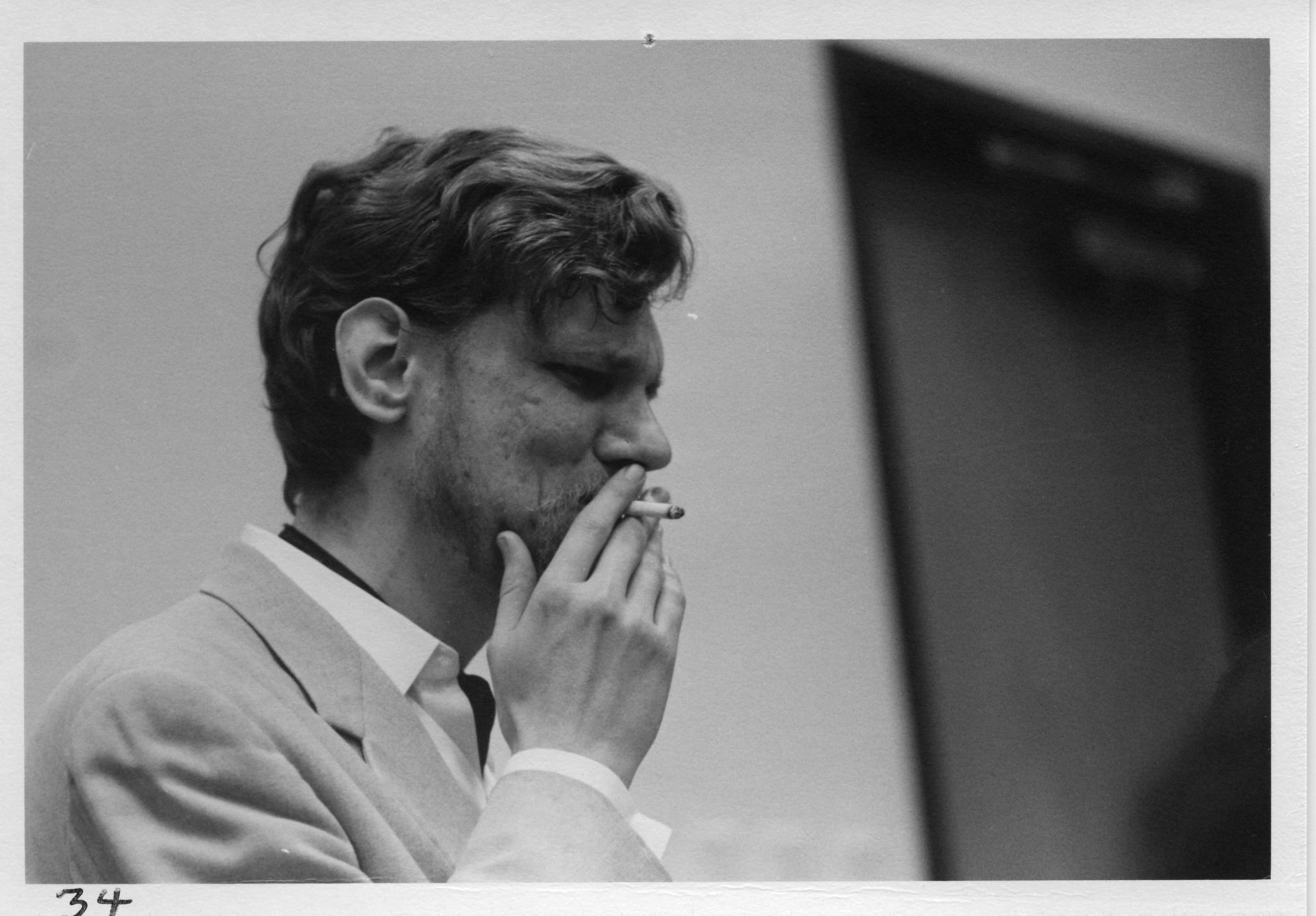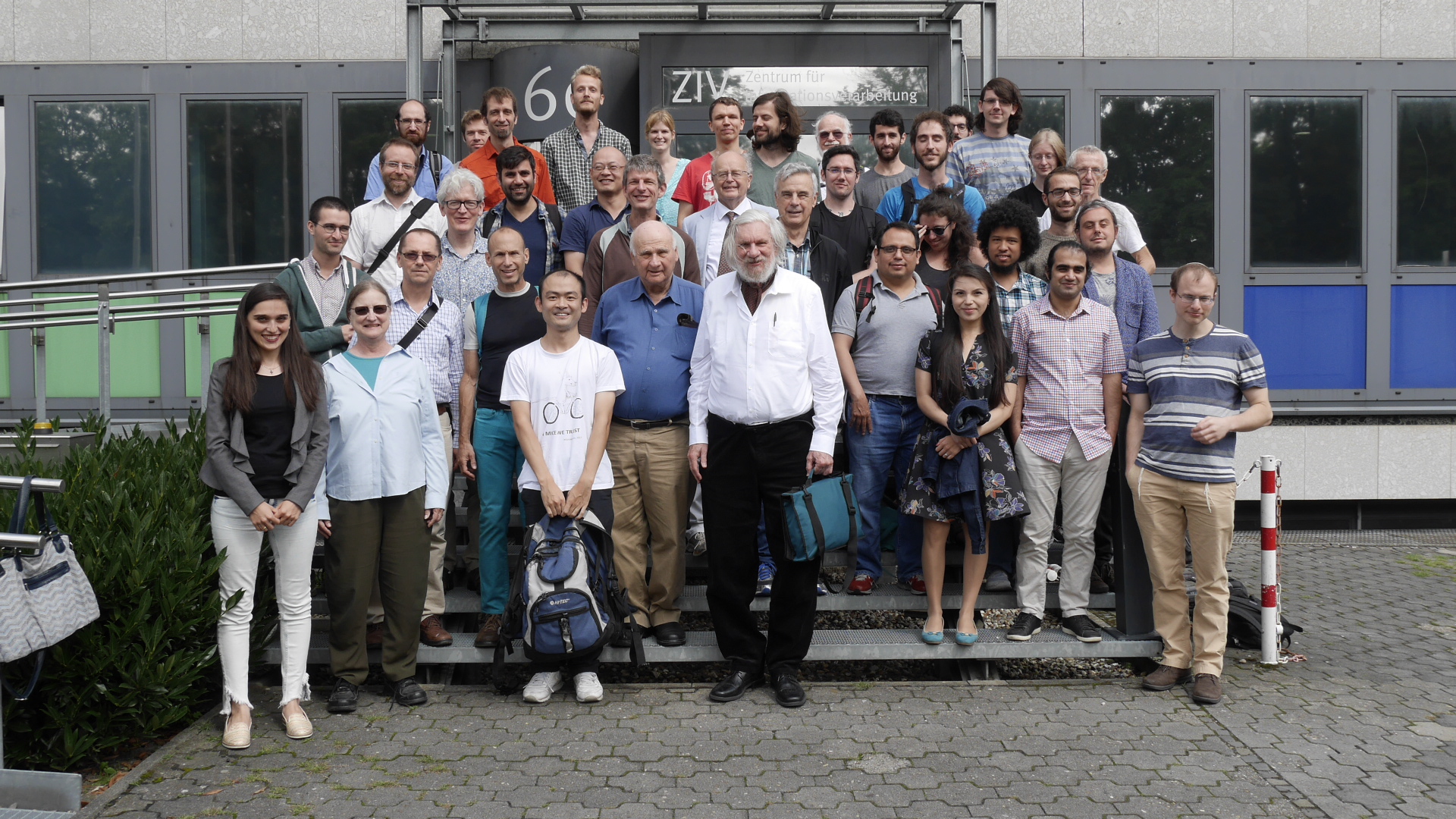 |
© Picture taken by Stephen Givant, Berkeley, June 1971
Set theory conference
A conference on the occasion of Ronald B. Jensen's 80th birthday
Institut für Mathematische Logik und Grundlagenforschung, WWU Münster
Aug 02--Aug 04, 2017
List of speakers:
- Gunter Fuchs (CUNY)
- Moti Gitik (Tel Aviv University)
- Menachem Magidor (Jerusalem)
- Adrian Mathias (Reunion)
- Bill Mitchell (U. Florida)
- Itay Neeman (UCLA)
- Grigor Sargsyan (Rutgers)
-
- John Steel (Berkeley)
-
W. Hugh Woodin (Harvard)
- Martin Zeman (UC Irvine)
- Gunter Fuchs (CUNY)
- Moti Gitik (Tel Aviv University)
- Menachem Magidor (Jerusalem)
- Adrian Mathias (Reunion)
- Bill Mitchell (U. Florida)
- Itay Neeman (UCLA)
- Grigor Sargsyan (Rutgers)
- John Steel (Berkeley)
- W. Hugh Woodin (Harvard)
- Martin Zeman (UC Irvine)
Schedule:
| Wed, Aug 02 | Thu, Aug 03 | Fri, Aug 04 | |
| 9:30--10:30 | Gunter Fuchs | John Steel |
|
| 11:00--12:00 |
Menachem Magidor | Adrian Mathias | Itay Neeman |
| 14:30--15:30 |
Moti Gitik | Martin ZemanW. Hugh Woodin | |
| 16:00--17:00 |
Bill Mitchell | Grigor Sargsyan | |
| 18:30--∞ | Conference dinner |
Talks and abstracts:
-
Gunter Fuchs: Subcomplete forcing and its forcing principles
Subcomplete forcing was introduced by Ronald Jensen. It is a class of forcings that don't add reals, are stationary set preserving, but may change cofinalities of regular cardinals to be countable. Jensen showed that Martin's axiom for subcomplete forcing is consistent, assuming the consistency of a supercompact cardinal, and that it is consistent with CH. This makes forcing principles for this class of forcings stand out. I will survey some results concerning such principles, which can be formulated for other classes of forcing as well, in terms of consistency strength calibrations and consequences. The principles include hierarchies of (weak) bounded forcing axioms, (virtual) resurrection axioms, and maximality principles. The weak/virtual principles arise from the original principles, formulated in terms of the existence of elementary embeddings, by requiring only the existence of generic embeddings, and it turns out that the consistency strengths of the arising principles can be determined precisely. The focus in terms of consequences of the principles is on the failure of (weak/threaded) square principles, but I will also mention principles that imply the existence of definable well-orderings of P(ω1). Time permitting, I will also talk about parametric generalizations of subcompleteness, which give rise to classes of forcings that enjoy nice closure properties and come with iteration theorems as well. Slides: Fuchs, Fuchs2. -
Moti Gitik: Extender based forcing with overlapping extenders and Shelah weak hypothesis
Notes by rds: Gitik. -
Menachem Magidor: Inner models constructed by using generalized logics (ongoing work)
I shall survey some recent developments in an ongoing project (jointly with J. Kennedy and J. Väänänen) in which we study inner models which are constructed similarly to L, but where we replace first order logic by some generalized logic. The issues we shall consider are basic properties and absoluteness of the models. Special role will be played by the model we get by using stationary logic. Slides: Magidor. -
Adrian Mathias: Linking descriptive set theory to symbolic dynamics
In my paper "Analytic sets under attack", Mathematical Proceedings of the Cambridge philosophical Society, volume 138 (2005) pp 465-485, among other results concerning the iteration of the (backwards) shift function on Baire space, a recursive point was found for which the sequence of derived ω-limit sets does not stabilise until the first uncountable ordinal. This talk will present the main ideas in the hope that further development will follow, and will list some open problems. Slides: Mathias. -
Bill Mitchell: Sweating the Small Stuff
Hamkins and Löwe asked whether it is consistent that VCol(ω , λ) ≡ V for every infinite cardinal λ. Mohamud Golshani and I showed that it is consistent, assuming large cardinal strength, and eventually exactly determined the necessary large cardinal strength: a sequence of extenders on a cardinal κ having a measure U together with κ+ many extenders having U as their associated normal ultrafilter. However, this statement is inprecise, it refers to the set of true sentences, and hence is not a sentence of ZFC. Here, we specify a mouse as the exact consistency strength of the Hamkins-Löwe property. Slides: Mitchell. -
Itay Neeman: Equiconsistencies at subcompact cardinals
We present some equiconsistency results at the level of +n -subcompact cardinals for n< ω, assuming the strategic branches hypothesis for short extenders. For example we show assuming SBH that any threadable Woodin cardinal at which square fails is subcompact in an inner model. We discuss additional results at finite n>1, though these are less elegant since the exact characterization of square at these levels is still open. The results rely on the stacking methods that had been introduced by Jensen-Schindler-Schimmerling-Steel, adapted to long extender settings similar (and in retrospect equivalent) to ones developed by Woodin, with inner model constructions that are fully backgrounded by short extenders. This is joint work with John Steel. Slides: Neeman. -
Grigor Sargsyan: Recent results in descriptive inner model theory
We will outline recent results in descriptive inner model theory, and will state open problems and research directions. Slides: Sargsyan. -
John R. Steel: What is a mouse?
A mouse is an iterable premouse. Or is it? We shall discuss some of the varieties of premice, and the properties that iteration strategies can have. Then we shall suggest a definition of "mouse" in the short-extender realm that differs slightly from the "iterable premouse" formulation. Notes by rds: Steel. -
W. Hugh Woodin: The one generator framework
We define the one generator framework for fine-structural strategic-extender models. Roughly, the one generator condition is simply the condition that extenders have a largest generator and at most one generator past the shortest initial segment not in their ultrapowers. This turns out to completely dictate essential features of the hierarchy with a number of surprising implications for the long-extender regime past the finite levels of supercompact. Notes by rds: Woodin. -
Martin Zeman: Constructing precipitous ideals with strong properties on small regular cardinals
I will present a construction which produces precipitous ideals on small regular cardinals in a way that enables a lot of control of various parameters of the associated generic embeddings, like for instance the image of the critical point. The construction builds on the well-known Kunen-Magidor construction, but unlike the Kunen-Magidor construction, which needs an almost huge embedding to start with, it only uses an embedding at a superstrong level, which is much weaker and has significantly lower consistency strength. Notes by rds: Zeman.
Registered participants:
| Juan P. Aguilera | TU Wien | Dinner: yes |
| Mariam Beriashvili | Tbilisi | Dinner: yes |
| Doug Blue | Harvard | Dinner: yes |
| Rupert McCallum | Tübingen | Dinner: yes |
| Fabiana Castiblanco | Münster | Dinner: no |
| Justin Cavitt | Harvard | Dinner: no |
| Vincenzo Dimonte | Udine | Dinner: no |
| Henry Ehimetalor | Denver | Dinner: no |
| Gabriel Fernandes | Münster | Dinner: yes |
| Gunter Fuchs | CUNY | Dinner: yes |
| Moti Gitik | Tel Aviv | Dinner: yes |
| Gabriel Goldberg | Harvard | Dinner: yes |
| Peter Göppert | Bochum | Dinner: no |
| Miha Habič | CUNY | Dinner: no |
| Yair Hayut | HU Jerusalem | Dinner: no |
| Radek Honzik | Charles University, Prague | Dinner: yes |
| Ronald Jensen | HU Berlin | Dinner: yes 2x |
| Asaf Karagila | Jerusalem | Dinner: yes |
| Yurii Khomskii | Amsterdam | Dinner: no |
| Martin Köberl | Rutgers | Dinner: yes |
| Jean Larson | University of Florida | Dinner: yes |
| Robert Lubarsky | Boca Raton | Dinner: yes |
| Menachem Magidor | HU Jerusalem | Dinner: yes |
| Adrian Mathias | Reunion | Dinner: yes 2x |
| Stefan Miedzianowski | Münster | Dinner: yes |
| Kaethe Minden | CUNY | Dinner: no |
| Bill Mitchell | Gainesville | Dinner: yes 2x |
| Rahman Mohammadpour | Paris | Dinner: yes |
| Itay Neeman | UCLA | Dinner: yes |
| Dan Saattrup Nielsen | Bristol | Dinner: no |
| William Parker | Berlin | Dinner: yes |
| Grigor Sargsyan | Rutgers | Dinner: yes 2x |
| Ralf Schindler | Münster | Dinner: yes 3x |
| Philipp Schlicht | Bonn | Dinner: yes |
| Farmer Schlutzenberg | Münster | Dinner: yes |
| John Steel | UC Berkeley | Dinner: yes 2x |
| Sarka Stejskalova | Institute of Mathematics, Prague | Dinner: yes |
| Victor Torres-Perez | Vienna | Dinner: no |
| Sandra Uhlenbrock | Wien | Dinner: yes |
| Jouko Väänänen | Helsinki | Dinner: yes |
| Philip Welch | Bristol | Dinner: yes |
| Trevor Wilson | Oxford, OH | Dinner: no |
| Hugh Woodin | Harvard | Dinner: yes |
| Shi Xianghui | Beijing | Dinner: yes |
| Martin Zeman | UC Irvine | Dinner: yes |
| Yizheng Zhu | Münster | Dinner: yes |
 |